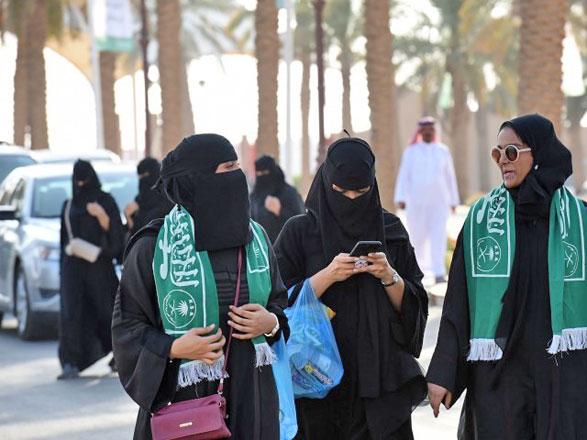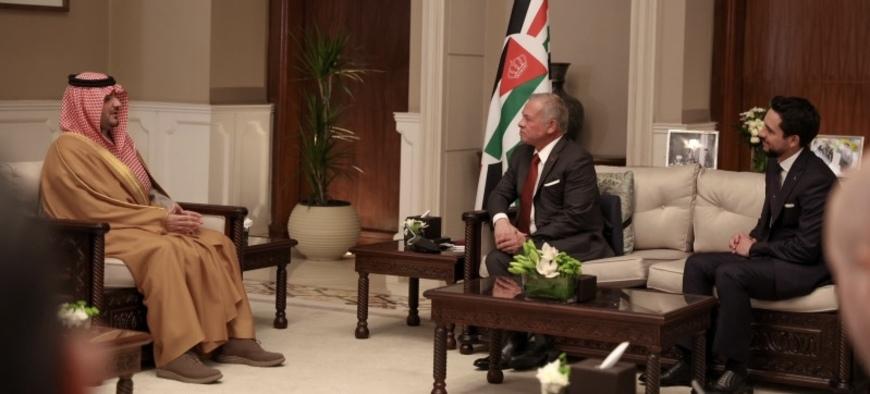You are here
Saudi Arabia reshuffles Cabinet with eye on culture
By AFP - Jun 03,2018 - Last updated at Jun 03,2018

Saudi families arrive outside a stadium to attend an event in the capital Riyadh (AFP photo)
RIYADH, Saudi Arabia — Saudi Arabia announced another Cabinet reshuffle on Saturday with a heavy focus on culture and religion, as the kingdom undergoes a major image overhaul.
This is the second significant government change since the appointment of Prince Mohammed Bin Salman, son of the king, as heir to the region's most powerful throne.
The crown prince serves as deputy prime minister under his father, King Salman.
State news agency SPA announced King Salman had replaced the country's labour and Islamic affairs ministers — and named a prince linked to the purchase of a Leonardo da Vinci painting of Jesus as culture minister.
Saudi Arabia for decades has combined its culture and information ministries.
The decree announced the culture ministry was now a separate entity under Prince Badr Bin Abdullah, the man named by The New York Times as the mystery buyer of Da Vinci's "Salvator Mundi" for a record-breaking $450 million at auction last year.
The Wall Street Journal later reported that he was acting on behalf of Prince Mohammed. The Louvre Abu Dhabi has said the religious painting was "acquired" by the Emirati authorities and would be put on display there.
Non-Muslim worship is banned in Saudi Arabia, but the kingdom has hosted high-ranking Christian clerics in recent months, notably from Lebanon and France.
In April, the Vatican signed a memorandum for a meeting with Saudi officials every three years.
Ahmed Bin Suleiman Al Rajhi, an engineer and private sector businessman, was on Saturday named labour and social development minister. Sheikh Abdullatif Bin Abdulaziz Al Sheikh was named the new Islamic affairs minister.
Prince Mohammed, who has steadily consolidated his grip on power since sidelining his cousin as crown prince last June, has spearheaded a string of policy changes in ultraconservative Saudi Arabia, including reinstating cinemas and allowing women to drive.
Often referred to by his initials, MBS, the prince pledged a "moderate, open" Saudi Arabia in a televised keynote speech in October, telling international investors his country wanted "to live a normal life".
Saudi Arabia has been dominated by a harsh strain of conservative Islam since the 1979 seizure of the Grand Mosque of Mecca by around 400 extremists, a reaction against what they saw as Saudi society's plunge into immorality with entertainment, including cinema and television, and women taking jobs.
A bloody military assault dislodged them two weeks later, leaving scores dead on both sides. Their influence, however, has remained.
Over the past year, Prince Mohammed has steered a modernisation campaign that aims to sell the country to foreign audiences and investors, with hundreds of billions of dollars pledged to projects that will boost tourism and entertainment.
On Friday, the crown prince earned a warning from Al Qaeda in the Arabian Peninsula (AQAP), the militants group's Yemen-based branch, over his "sinful projects", which AQAP said included a WWE wrestling event hosted by the kingdom in April.
Saudi Arabia, an absolute monarchy, will welcome millions of Muslim faithful on their annual pilgrimage to Mecca, Islam's holiest city, come August.
The kingdom on Saturday announced it had set up a royal commission for Mecca, to be chaired by Prince Mohammed. No further details were made available.
The Cabinet reshuffle comes as many activists remain behind bars, after at least 11 of them were detained last month.
They have been identified by rights groups as mostly veteran women campaigners for the right to drive — and to end Saudi's male guardianship system, under which women must still secure the approval of their fathers, brothers or husbands to travel or study.
At least four activists have been released, according to Amnesty International. The fate of the others remains unclear.
Prince Mohammed is also seen as the driving force behind the detention of 200 royals and businessmen at the Ritz Carlton in November in what the government said was a crackdown on corruption.
Most have since been released, after reaching settlements with the state.
Related Articles
King Abdullah named a new health minister Monday to lead the fight against the MERS virus that has cost more than 350 lives in Saudi Arabia, after his predecessor was sacked.
RIYADH — Artists in Saudi Arabia are pushing boundaries as the kingdom undergoes rapid change and tries to boost its cultural offerings, a S
















